Samsung SGH-T399 (T-Mobile) User Manual
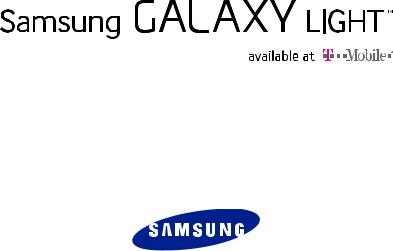
4 G L T E S M A R T P H O N E
User Manual
Please read this manual before operating your phone and keep it for future reference.

Warning! This product contains chemicals known to the State of California to cause cancer and reproductive toxicity.
Intellectual Property
All Intellectual Property, as defined below, owned by or which is otherwise the property of Samsung or its respective suppliers relating to the SAMSUNG Phone, including but not limited to, accessories, parts, or software relating there to (the “Phone System”), is proprietary to Samsung and protected under federal laws, state laws, and international treaty provisions. Intellectual Property includes, but is not limited to, inventions (patentable or unpatentable), patents, trade secrets, copyrights, software, computer programs, and related documentation and other works of authorship. You may not infringe or otherwise violate the rights secured by the Intellectual Property. Moreover, you agree that you will not (and will not attempt to) modify, prepare derivative works of, reverse engineer, decompile, disassemble, or otherwise attempt to create source code from the software. No title to or ownership in the Intellectual Property is transferred to you. All applicable rights of the Intellectual Property shall remain
with SAMSUNG and its suppliers.
Open Source Software
Some software components of this product incorporate source code covered under GNU General Public License (GPL), GNU Lesser General Public License (LGPL), OpenSSL License, BSD License and other open source licenses. To obtain the source code covered under the open source licenses, please visit:
http://opensource.samsung.com.
Disclaimer of Warranties; Exclusion of Liability
EXCEPT AS SET FORTH IN THE EXPRESS WARRANTY CONTAINED ON THE WARRANTY PAGE ENCLOSED WITH THE PRODUCT, THE PURCHASER TAKES THE PRODUCT "AS IS", AND SAMSUNG MAKES NO EXPRESS OR IMPLIED WARRANTY OF ANY KIND WHATSOEVER WITH RESPECT TO THE PRODUCT, INCLUDING BUT NOT LIMITED TO THE MERCHANTABILITY OF THE PRODUCT OR
T399_UM_English_MHG_PS_121613_F5
ITS FITNESS FOR ANY PARTICULAR PURPOSE OR USE; THE DESIGN, CONDITION OR QUALITY OF THE PRODUCT; THE PERFORMANCE OF THE PRODUCT; THE WORKMANSHIP OF THE PRODUCT OR THE COMPONENTS CONTAINED THEREIN; OR COMPLIANCE OF THE PRODUCT WITH THE REQUIREMENTS OF ANY LAW, RULE, SPECIFICATION OR CONTRACT PERTAINING THERETO. NOTHING CONTAINED IN THE INSTRUCTION MANUAL SHALL BE CONSTRUED TO CREATE AN EXPRESS OR IMPLIED WARRANTY OF ANY KIND WHATSOEVER WITH RESPECT TO THE PRODUCT. IN ADDITION, SAMSUNG SHALL NOT BE LIABLE FOR ANY DAMAGES OF ANY KIND RESULTING FROM THE PURCHASE OR USE OF THE PRODUCT OR ARISING FROM THE BREACH OF THE EXPRESS WARRANTY, INCLUDING INCIDENTAL, SPECIAL OR CONSEQUENTIAL DAMAGES, OR LOSS OF ANTICIPATED PROFITS OR BENEFITS.
Modification of Software
SAMSUNG IS NOT LIABLE FOR PERFORMANCE ISSUES OR INCOMPATIBILITIES CAUSED BY YOUR EDITING OF REGISTRY SETTINGS, OR YOUR MODIFICATION OF OPERATING SYSTEM SOFTWARE.
USING CUSTOM OPERATING SYSTEM SOFTWARE MAY CAUSE YOUR DEVICE AND APPLICATIONS TO WORK IMPROPERLY. YOUR CARRIER MAY NOT PERMIT USERS TO DOWNLOAD CERTAIN SOFTWARE, SUCH AS CUSTOM OS.
SAFE™ (Samsung Approved For Enterprise)
SAFE™: "SAFE™" (Samsung for Enterprise) is a mark for a Samsung device which has been tested against Samsung's own internal criteria for interoperability with certain third party security-related solutions for MDM and VPN. The testing includes field testing with local network connection and menu tree testing which tests functionality of the solutions in conjunction with the Samsung device. During the testing, the device is tested with the security solutions to see if the solutions work with the device as described by the third party security solution providers. The testing, for example, includes field testing with local network connection and menu tree testing which tests functionality of the solutions in conjunction with the Samsung device. For more information about Samsung's SAFE™ program, please refer to www.samsung.com/us/safe.
Disclaimer of Warranties: EXCEPT AS OTHERWISE PROVIDED IN THEIR STANDARD END USER LICENSE AND WARRANTY, TO THE FULL EXTENT PERMITTED BY LAW SAMSUNG ELECTRONICS CO., LTD., SAMSUNG TELECOMMUNICATIONS AMERICA, LLC, AND
THEIR AFFILIATES (COLLECTIVELY REFERRED TO HEREIN AS THE "SAMSUNG ENTITIES") EXPRESSLY DISCLAIM ANY AND ALL WARRANTIES, EXPRESS OR IMPLIED, INCLUDING ANY WARRANTY OF MERCHANTABILITY, FITNESS FOR A PARTICULAR PURPOSE, INTEROPERABILITY OR NON-INFRINGEMENT, WITH RESPECT TO INFORMATION TECHNOLOGY SECURITY PROTECTION, SAFE™ DEVICES AND APPLICATIONS TESTED WITH SAFE™ DEVICES. IN NO EVENT SHALL THE SAMSUNG ENTITIES BE LIABLE FOR ANY DIRECT, INDIRECT, INCIDENTAL, PUNITIVE, OR CONSEQUENTIAL DAMAGES OF ANY KIND WHATSOEVER WITH RESPECT TO INFORMATION TECHNOLOGY SECURITY PROTECTION, SAFE™ DEVICES OR APPLICATIONS TESTED WITH SAFE™ DEVICES. In addition, information technology security protection will be affected by features or functionality associated with, among other things the e-mail platform, master data management, and virtual private network solutions selected by the software provider, solution provider or user. Choice of an e-mail, master data management, and virtual private network solution is at the sole discretion of the software provider, solution provider or user and any associated effect on information technology security protection is solely the responsibility of the software provider, solution provider or user. For complete statement of limited warranty, please refer to www.samsung.com/us/safe, available on the web and where Samsung smartphone and Galaxy Tab™ devices are sold. [101212]
Samsung Telecommunications America (STA), LLC
Headquarters:
1301 E. Lookout Drive
Richardson, TX 75082
Customer Care Center:
1000 Klein Rd.
Plano, TX 75074
Toll Free Tel: 1.888.987.HELP (4357)
Internet Address:
http://www.samsung.com
©2013 Samsung Telecommunications America, LLC. Samsung is a registered trademark of Samsung Electronics Co., Ltd.
Do you have questions about your Samsung Mobile Device?
For 24 hour information and assistance, we offer a new FAQ/ARS System (Automated Response System) at: www.samsung.com/us/support
The actual available capacity of the internal memory is less than the specified capacity because the operating system and default applications occupy part of the memory. The available capacity may change when you upgrade the device.
Nuance®, VSuite™, T9® Text Input, and the Nuance logo are trademarks or registered trademarks of Nuance Communications, Inc., or its affiliates in the United States and/or other countries.
ACCESS® and NetFront™ are trademarks or registered trademarks of ACCESS Co., Ltd. in Japan and other countries.
The Bluetooth® word mark, figure mark (stylized “B Design”), and combination mark (Bluetooth word mark and “B Design”) are registered trademarks and are wholly owned by the Bluetooth SIG.
microSD™ and the microSD logo are Trademarks of the SD Card Association. Openwave® is a registered Trademark of Openwave, Inc.
Google, the Google logo, Android, the Android logo, Google Play, Gmail, Google Mail, Google Maps, Google Music, Google Talk, Hangouts, Picasa, YouTube and other marks are trademarks of Google Inc.
Isis Mobile Wallet is available for use with participating merchants only. Isis Terms of Service are available at paywithisis.com. Eligibility of payment cards, loyalty cards and offers depends on card issuer and merchant participation. Message and data charges, and certain Isis Cash Card fees, may apply.
Wi-Fi is a registered trademark of the Wireless Fidelity Alliance, Inc.
LTE is a trademark of ETSI
Swype and the Swype logos are trademarks of Swype, Inc. © 2010 Swype, Inc. All rights reserved.
Dynamic Noise Suppression from Audience
Your phone is equipped with an advanced voice processing chip that delivers clear mobile calls by suppressing background noise, intermittent sounds (like a siren or nearby conversation), and echoes, allowing you to hear and be heard nearly anywhere.
How Does It Work?
Based on the intelligence of the human hearing system, the technology:
•Captures, evaluates and distinguishes all the sound signals surrounding your phone, and the person you're speaking with.
•Then isolates the primary voice in conversation and filters out the background noise - so the person you're calling hears only your voice, without disturbing background noise.
•Dynamically equalizes and adjusts voice volume to optimize your calling experience, so you can hear clearly and don't need to speak louder to overcome surrounding noise.
The noise suppression technology is built-in and already enabled in your new mobile phone. So it's ready to provide unsurpassed voice clarity with every call.

Table of Contents
Section 1: Getting Started .......................... |
6 |
Understanding this User Manual . . . . . . . . . . . . 6 Battery Cover . . . . . . . . . . . . . . . . . . . . . . . . . . 7 Battery . . . . . . . . . . . . . . . . . . . . . . . . . . . . . . 11 Extending Your Battery Life . . . . . . . . . . . . . . 14 Switching the Device On or Off . . . . . . . . . . . . 15 Initial Device Configuration . . . . . . . . . . . . . . . 15 Restarting the Device . . . . . . . . . . . . . . . . . . . 18 Locking and Unlocking the Device . . . . . . . . . 18 Voicemail . . . . . . . . . . . . . . . . . . . . . . . . . . . . 18 Task Manager . . . . . . . . . . . . . . . . . . . . . . . . 19
Section 2: Understanding Your Device .... |
21 |
Features of Your Device . . . . . . . . . . . . . . . . . 21
Front View . . . . . . . . . . . . . . . . . . . . . . . . . . . 22
Back View . . . . . . . . . . . . . . . . . . . . . . . . . . . 24
Side Views . . . . . . . . . . . . . . . . . . . . . . . . . . . 25
Status Bar . . . . . . . . . . . . . . . . . . . . . . . . . . . 25
Home Screen . . . . . . . . . . . . . . . . . . . . . . . . . 31
Screen Navigation . . . . . . . . . . . . . . . . . . . . . 35
Menu Navigation . . . . . . . . . . . . . . . . . . . . . . 37
Customizing the Screens . . . . . . . . . . . . . . . . 38
Section 3: Call Functions and |
|
Contacts List .............................................. |
45 |
Displaying Your Phone Number . . . . . . . . . . . 45
Making a Call . . . . . . . . . . . . . . . . . . . . . . . . . 45
Ending a Call . . . . . . . . . . . . . . . . . . . . . . . . . 46
Making Emergency Calls . . . . . . . . . . . . . . . . 47
Dialing Options . . . . . . . . . . . . . . . . . . . . . . . . 48
Answering a Call . . . . . . . . . . . . . . . . . . . . . . 49
Managing Reject Calls . . . . . . . . . . . . . . . . . . 49
International Calls . . . . . . . . . . . . . . . . . . . . . 50
Pause Dialing . . . . . . . . . . . . . . . . . . . . . . . . . 51
Wait Dialing . . . . . . . . . . . . . . . . . . . . . . . . . . 51
Redialing the Last Number . . . . . . . . . . . . . . . 52
Speed Dialing . . . . . . . . . . . . . . . . . . . . . . . . . 52
In Call Options . . . . . . . . . . . . . . . . . . . . . . . . 54
Logs Tab . . . . . . . . . . . . . . . . . . . . . . . . . . . . 58
1
Section 4: Entering Text ............................ |
62 |
Text Input Methods . . . . . . . . . . . . . . . . . . . . . |
62 |
Selecting the Text Input Method . . . . . . . . . . . |
62 |
Entering Text Using Swype . . . . . . . . . . . . . . . |
63 |
Using the Samsung Keyboard . . . . . . . . . . . . . |
67 |
Using the Google Voice Typing . . . . . . . . . . . . . |
70 |
Section 5: Contacts ................................... |
72 |
Accounts . . . . . . . . . . . . . . . . . . . . . . . . . . . . . 72 Contacts List . . . . . . . . . . . . . . . . . . . . . . . . . . 72 Contact List Options . . . . . . . . . . . . . . . . . . . . 78 Contact Menu Options . . . . . . . . . . . . . . . . . . . 78 Contact Entry Options . . . . . . . . . . . . . . . . . . . 79 Linking Contact Information . . . . . . . . . . . . . . . 80 Sending a Namecard . . . . . . . . . . . . . . . . . . . . 82 Copying Contact Information . . . . . . . . . . . . . . 84 Synchronizing Contacts . . . . . . . . . . . . . . . . . . 85 Display Options . . . . . . . . . . . . . . . . . . . . . . . . 86 Adding more Contacts via Accounts and Sync . 86 Additional Contact Options . . . . . . . . . . . . . . . 87 Groups . . . . . . . . . . . . . . . . . . . . . . . . . . . . . . 88 The Favorites Tab . . . . . . . . . . . . . . . . . . . . . . 90
Section 6: Messaging ............................... |
91 |
Types of Messages . . . . . . . . . . . . . . . . . . . . .91
Creating and Sending Messages . . . . . . . . . . .91
Message Options . . . . . . . . . . . . . . . . . . . . . . .93
Viewing Newly Received Messages . . . . . . . . .96
Deleting Messages . . . . . . . . . . . . . . . . . . . . .98
Message Search . . . . . . . . . . . . . . . . . . . . . . .99
Messaging Settings . . . . . . . . . . . . . . . . . . . . .99
Assigning Messages as Spam . . . . . . . . . . . .102
Accessing Your Spam Folder . . . . . . . . . . . . .104
Text Templates . . . . . . . . . . . . . . . . . . . . . . .104
Using Email . . . . . . . . . . . . . . . . . . . . . . . . . .104
Microsoft Exchange Email (Outlook) . . . . . . . .109
Section 7: Multimedia ............................. |
115 |
Assigning the Default Storage Location . . . . .115
Using the Camera . . . . . . . . . . . . . . . . . . . . .116
Camera Options . . . . . . . . . . . . . . . . . . . . . . .117
Quick Settings . . . . . . . . . . . . . . . . . . . . . . . .119
Camera and Camcorder Settings . . . . . . . . . .119
Using the Camcorder . . . . . . . . . . . . . . . . . . .123
Sharing Pictures . . . . . . . . . . . . . . . . . . . . . .125
Editing a Photo . . . . . . . . . . . . . . . . . . . . . . .131
2
The Gallery . . . . . . . . . . . . . . . . . . . . . . . . . 132
AllShare Cast Hub . . . . . . . . . . . . . . . . . . . . 132
Section 8: Applications and |
|
Development ............................................ |
134 |
Applications . . . . . . . . . . . . . . . . . . . . . . . . . 134
Calculator . . . . . . . . . . . . . . . . . . . . . . . . . . 136
Calendar . . . . . . . . . . . . . . . . . . . . . . . . . . . 136
Camera . . . . . . . . . . . . . . . . . . . . . . . . . . . . 138
Chrome . . . . . . . . . . . . . . . . . . . . . . . . . . . . 139
Clock . . . . . . . . . . . . . . . . . . . . . . . . . . . . . . 139
Contacts . . . . . . . . . . . . . . . . . . . . . . . . . . . 143
Downloads . . . . . . . . . . . . . . . . . . . . . . . . . . 143
Dropbox . . . . . . . . . . . . . . . . . . . . . . . . . . . . 143
Email . . . . . . . . . . . . . . . . . . . . . . . . . . . . . . 145
Gallery . . . . . . . . . . . . . . . . . . . . . . . . . . . . . 146
Gmail . . . . . . . . . . . . . . . . . . . . . . . . . . . . . . 146
Google . . . . . . . . . . . . . . . . . . . . . . . . . . . . . 148
Google Settings . . . . . . . . . . . . . . . . . . . . . . 149
Google + . . . . . . . . . . . . . . . . . . . . . . . . . . . 149
Group Play . . . . . . . . . . . . . . . . . . . . . . . . . . 150
Hangouts . . . . . . . . . . . . . . . . . . . . . . . . . . . 151
Help . . . . . . . . . . . . . . . . . . . . . . . . . . . . . . . 152
Internet . . . . . . . . . . . . . . . . . . . . . . . . . . . . |
152 |
Isis Wallet . . . . . . . . . . . . . . . . . . . . . . . . . . |
159 |
Local . . . . . . . . . . . . . . . . . . . . . . . . . . . . . . |
160 |
Lookout Security . . . . . . . . . . . . . . . . . . . . . |
160 |
Maps . . . . . . . . . . . . . . . . . . . . . . . . . . . . . . |
161 |
Media Hub . . . . . . . . . . . . . . . . . . . . . . . . . . |
164 |
Memo . . . . . . . . . . . . . . . . . . . . . . . . . . . . . |
166 |
Messaging . . . . . . . . . . . . . . . . . . . . . . . . . . |
167 |
Messenger . . . . . . . . . . . . . . . . . . . . . . . . . . |
167 |
Mobile HotSpot . . . . . . . . . . . . . . . . . . . . . . . |
168 |
Music . . . . . . . . . . . . . . . . . . . . . . . . . . . . . . |
168 |
Using Playlists . . . . . . . . . . . . . . . . . . . . . . . |
171 |
Creating a Playlist . . . . . . . . . . . . . . . . . . . . |
171 |
Transferring Music Files . . . . . . . . . . . . . . . . |
172 |
Removing Music Files . . . . . . . . . . . . . . . . . |
173 |
Music Hub . . . . . . . . . . . . . . . . . . . . . . . . . . |
173 |
My Files . . . . . . . . . . . . . . . . . . . . . . . . . . . . |
174 |
Navigation . . . . . . . . . . . . . . . . . . . . . . . . . . |
176 |
Phone . . . . . . . . . . . . . . . . . . . . . . . . . . . . . |
178 |
Play Books . . . . . . . . . . . . . . . . . . . . . . . . . . |
178 |
Play Magazines . . . . . . . . . . . . . . . . . . . . . . |
179 |
Play Movies & TV . . . . . . . . . . . . . . . . . . . . . |
179 |
3
Play Music . . . . . . . . . . . . . . . . . . . . . . . . . . 180
Play Store . . . . . . . . . . . . . . . . . . . . . . . . . . . 187
Downloading a New Google Application . . . . . 187
Launching an Installed Google Application . . . 189
S Translator . . . . . . . . . . . . . . . . . . . . . . . . . 190
Using S Voice . . . . . . . . . . . . . . . . . . . . . . . . 191
Samsung Apps . . . . . . . . . . . . . . . . . . . . . . . 192
Settings . . . . . . . . . . . . . . . . . . . . . . . . . . . . . 193
T-Mobile My Account . . . . . . . . . . . . . . . . . . 193
T-Mobile Name ID . . . . . . . . . . . . . . . . . . . . . 194
T-Mobile TV . . . . . . . . . . . . . . . . . . . . . . . . . . 194
Video . . . . . . . . . . . . . . . . . . . . . . . . . . . . . . . 195
Visual Voicemail . . . . . . . . . . . . . . . . . . . . . . 196
Voice Recorder . . . . . . . . . . . . . . . . . . . . . . . 197
Voice Search . . . . . . . . . . . . . . . . . . . . . . . . . 198
YouTube . . . . . . . . . . . . . . . . . . . . . . . . . . . . 198
Section 9: Connections ........................... |
200 |
Bluetooth . . . . . . . . . . . . . . . . . . . . . . . . . . . 200 Enable Downloading for Web Applications . . . 204 PC Connections . . . . . . . . . . . . . . . . . . . . . . . 205 Wi-Fi . . . . . . . . . . . . . . . . . . . . . . . . . . . . . . . 206 USB Tethering . . . . . . . . . . . . . . . . . . . . . . . . 208
Mobile HotSpot . . . . . . . . . . . . . . . . . . . . . . .209
Section 10: Changing Your Settings ...... |
212 |
Accessing the Settings Tabs . . . . . . . . . . . . .212 Settings Tabs - Overview . . . . . . . . . . . . . . . .212 Wi-Fi Settings . . . . . . . . . . . . . . . . . . . . . . . .213 Bluetooth settings . . . . . . . . . . . . . . . . . . . . .218 Data Usage . . . . . . . . . . . . . . . . . . . . . . . . . .220 More Networks . . . . . . . . . . . . . . . . . . . . . . .221 Lock Screen . . . . . . . . . . . . . . . . . . . . . . . . .232 Display Settings . . . . . . . . . . . . . . . . . . . . . . .238 Sound Settings . . . . . . . . . . . . . . . . . . . . . . .239 Home Screen Mode . . . . . . . . . . . . . . . . . . . .242 Call Settings . . . . . . . . . . . . . . . . . . . . . . . . .242 Blocking Mode . . . . . . . . . . . . . . . . . . . . . . . .252 Driving Mode . . . . . . . . . . . . . . . . . . . . . . . . .253 Power Saving Mode . . . . . . . . . . . . . . . . . . . .253 Accessory . . . . . . . . . . . . . . . . . . . . . . . . . . .254 Accessibility Settings . . . . . . . . . . . . . . . . . . .254 Language and Input Settings . . . . . . . . . . . . .256 Smart screen . . . . . . . . . . . . . . . . . . . . . . . . .263 Voice control . . . . . . . . . . . . . . . . . . . . . . . . .263 Add Account . . . . . . . . . . . . . . . . . . . . . . . . .264
4
Cloud . . . . . . . . . . . . . . . . . . . . . . . . . . . . . . 266 Backup and Reset . . . . . . . . . . . . . . . . . . . . 267 Backing up Your Data Before Factory Reset . 267 Location Services . . . . . . . . . . . . . . . . . . . . . 272 Security . . . . . . . . . . . . . . . . . . . . . . . . . . . . 273 Application Manager . . . . . . . . . . . . . . . . . . 275 Battery Usage . . . . . . . . . . . . . . . . . . . . . . . 278 SD Card & Device Storage . . . . . . . . . . . . . . 278 Date and Time . . . . . . . . . . . . . . . . . . . . . . . 280 About Device . . . . . . . . . . . . . . . . . . . . . . . . 280 Software Update . . . . . . . . . . . . . . . . . . . . . 281
Section 11: Health and Safety |
|
Information .............................................. |
283 |
Exposure to Radio Frequency (RF) Signals . . |
283 |
Specific Absorption Rate (SAR) Certification |
|
Information . . . . . . . . . . . . . . . . . . . . . . . . |
288 |
FCC Part 15 Information to User . . . . . . . . . . |
290 |
Commercial Mobile Alerting System (CMAS) . 290 |
|
Smart Practices While Driving . . . . . . . . . . . |
290 |
Battery Use and Safety . . . . . . . . . . . . . . . . . |
292 |
Samsung Mobile Products and Recycling . . . |
293 |
UL Certified Travel Charger . . . . . . . . . . . . . |
295 |
Display / Touch-Screen . . . . . . . . . . . . . . . . 295 GPS & AGPS . . . . . . . . . . . . . . . . . . . . . . . . . 296 Emergency Calls . . . . . . . . . . . . . . . . . . . . . 297 Care and Maintenance . . . . . . . . . . . . . . . . . 297 Responsible Listening . . . . . . . . . . . . . . . . . 298 Operating Environment . . . . . . . . . . . . . . . . . 301 FCC Hearing Aid Compatibility (HAC)
Regulations for Wireless Devices . . . . . . . 303 Restricting Children's Access to Your
Mobile Device . . . . . . . . . . . . . . . . . . . . . . 304 FCC Notice and Cautions . . . . . . . . . . . . . . . 305 Other Important Safety Information . . . . . . . . 305 Safety Tips . . . . . . . . . . . . . . . . . . . . . . . . . . 306 Caring For Your Phone . . . . . . . . . . . . . . . . . 307
Section 12: Warranty Information .......... |
308 |
Standard Limited Warranty . . . . . . . . . . . . . . |
308 |
End User License Agreement for Software . . |
313 |
Index ......................................................... |
321 |
5

Section 1: Getting Started
This section explains how to get started with your phone by installing and charging the battery, installing the micro SIM card and optional memory card, and setting up your voice mail.
Before using your device for the first time, you’ll need to install and charge the battery and install the micro SIM card.
The micro SIM card is loaded with your subscription details, such as your PIN, available optional services, and many other features. If desired, you can also install an SD card to store
media for use with your phone.
Understanding this User Manual
The sections of this manual generally follow the features of your phone. A robust index for features begins on page 321.
Also included is important safety information that you should know before using your phone. This information is available near the back of the guide, beginning on page 283.
This manual provides navigation instructions according to the default display settings. If you select other settings, navigation may be different.
Unless otherwise specified, all instructions in this manual assume you are starting from the Home screen and using the available keys.
Note: Instructions in this manual are based on default settings, and may vary from your device, depending on the software version on your device, and any changes to the device’s Settings.
Unless stated otherwise, instructions in this User Manual start with the device unlocked, at the Home screen.
All screen images in this manual are simulated. Actual displays may vary, depending on the software version of your device and any changes to the device’s Settings.
6

Special Text
Throughout this manual, you’ll find text that is set apart from the rest. These are intended to point out important information, share quick methods for activating features, to define terms, and more. The definitions for these methods are as follows:
•Notes: Presents alternative options for the current feature, menu, or sub-menu.
•Tips: Provides quick or innovative methods, or useful shortcuts.
•Important: Points out important information about the current feature that could affect performance.
•Warning: Brings to your attention important information to prevent loss of data or functionality, or even prevent damage to your phone.
Text Conventions
This manual provides condensed information about how to use your phone. To make this possible, the following text conventions are used to represent often-used steps:
Arrows are used to represent the sequence of selecting successive options in longer, or repetitive, procedures.
Example: From the Home screen, press  (Menu) Settings
(Menu) Settings
Connections tab Bluetooth.
Battery Cover
The battery, micro SIM card and SD card are installed under the battery cover.
Important! Before removing or replacing the battery cover, make sure the device is switched off. To turn the device off, hold down the  key until the Device options pop up displays, then tap Power off.
key until the Device options pop up displays, then tap Power off.
Caution! Do not bend or twist the back cover excessively during installation or removal. Doing so may damage the cover.
To remove the battery cover:
1.Hold the device firmly and locate the cover release latch (1).
2.Place your fingernail in the opening (2) and firmly “pop” the cover off the device (similar to a soda can).
Getting Started |
7 |
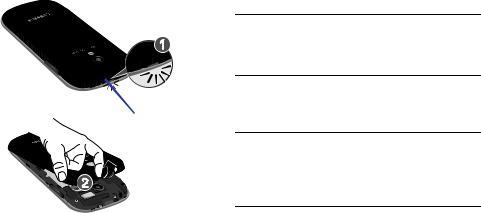
Release Latch
To replace the battery cover:
Position the battery cover over the battery compartment and press down until you hear a click.
SIM Card Overview
Important! Before removing or replacing the micro SIM card, make sure the device is switched off. To turn the phone off, hold down the  key until the Device options pop up displays, then tap Power off
key until the Device options pop up displays, then tap Power off
The micro SIM card is loaded with your subscription details such as your telephone number, PIN, available optional services, and many other features.
Important! The micro SIM card and its information can be easily damaged by scratching or bending, so be careful when handling, inserting, or removing the card. Keep all SIM cards out of reach of small children.
Some features on your device (such as Wi-Fi Calling) can be unlocked by using the new micro SIM card.
To use this new micro SIM card, call or contact T-Mobile customer service for more information.
This card contains the necessary information for identifying and authenticating the user to the IMS (IP Multimedia Subsystem).
8

Installing and Removing the SIM card
This device uses a different type of SIM card called a “micro SIM”. Other larger SIM cards will not function or fit within this slot.
To install the SIM card:
1.Carefully slide the micro SIM card into the SIM card socket until it clicks into place.
To remove the micro SIM card:
1.Remove the battery cover.
2.Remove the battery (page 11).
3.Carefully place your fingernail into the end of the micro SIM slot and begin to pull the card slightly out.
4.Carefully slide the card out of the micro SIM card socket.
Note: If the card is not inserted correctly, the device will not detect it and no service will be available. If this happens, turn off the device, remove the card, and reinstall the card in the correct orientation.
Micro SIM card
2.Make sure that the card’s gold contacts face into the phone and that the upper-left angled corner of the card is positioned as shown.
Getting Started |
9 |
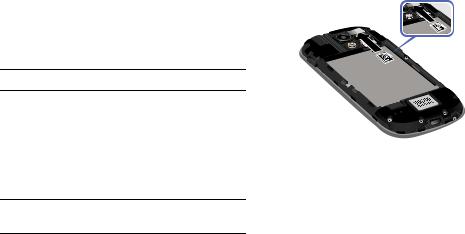
Installing the microSD Memory Card
Your device supports an optional (external) microSD™ memory cards for storage of media such as music, pictures, video and other files. The SD card is designed for use with this mobile device and other devices.
Note: This device supports a memory card of up to a 64GB.
1.Remove the battery cover.
2.Locate the microSD card slot on the inside of the device.
3.Orient the card with the gold strips facing down.
4.Carefully slide the microSD card into the card socket until it clicks into place.
Important! Be sure to align the gold contact pins on the card with the phone’s contact pins.
Removing the microSD Memory Card
1.Remove the battery cover.
2.Remove the battery (page 11).
3.Carefully place your fingernail into the end of the micro SIM slot and begin to pull the card slightly out.
4.Remove the card from the slot.
5.Replace the battery cover.
10
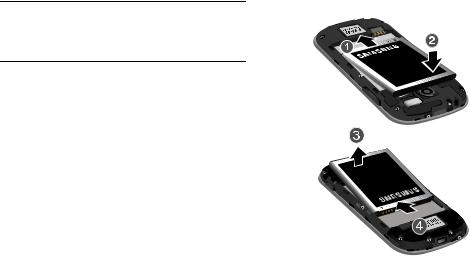
Battery
Before using your device for the first time, install the battery and charge it fully.
Important! Before removing or replacing the battery, make sure the device is switched off. To turn the device off, hold down the  key until the Device options pop up displays, then tap Power off
key until the Device options pop up displays, then tap Power off
Installing the Battery
1.Slide the battery into the compartment (1) so that the tabs on the end align with the slots at the bottom of the phone, making sure the connectors align.
2.Gently press down to secure the battery (2).
Removing the Battery
Grip the battery at the top end (3) and lift it up and out of the battery compartment (4).
Installing Battery
Removing Battery
Getting Started |
11 |
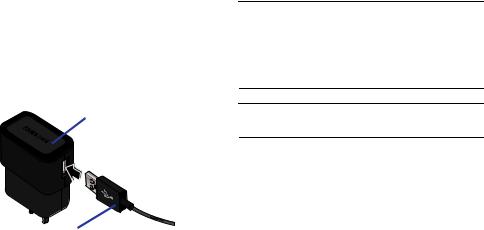
Charging the Battery
Your device is powered by a rechargeable Li-ion battery. A wall charger, which is used for charging the battery, is included with your device. Use only approved batteries and chargers. Ask your local Samsung dealer for further details.
Before using your device for the first time, you should fully charge the battery.
Charging Head
USB Cable
Note: Verify that the battery is installed prior to connecting the wall charger. If both the wall charger is connected and the battery is not installed, the handset will power cycle continuously and prevent proper operation. Failure to unplug the wall charger before you remove the battery, can cause the device to become damaged.
Important! It is recommended you fully charge the battery before using your device for the first time.
1.Connect the USB cable to the charging head.
2.Locate the Charger/Accessory jack.
3.Insert the USB cable into the device’s Charger/ Accessory jack.
4.Plug the charging head into a standard AC power outlet. The device turns on with the screen locked and indicates both its charge state and percent of charge.
12
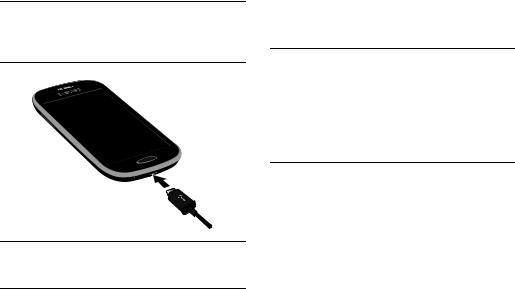
Warning! While the device is charging, if the touch screen does not function due to an unstable power supply unplug the USB power adapter from the power outlet or unplug the USB cable from the device.
Note: If the charger is incorrectly connected, damage to the accessory port will occur therefore voiding the phone’s warranty.
5.When charging is finished, first unplug the charger’s power plug from the AC wall outlet, then disconnect the charger’s connector from the phone.
Important! If your handset has a touch screen display, please note that a touch screen responds best to a light touch from the pad of your finger or a non-metallic stylus. Using excessive force or a metallic object when pressing on the touch screen may damage the tempered glass surface and void the warranty. For more information, refer to “Standard Limited Warranty” on page 308.
Getting Started |
13 |
Low Battery Indicator
When the battery level is low and only a few minutes of talk time remain (~15% charge), a warning tone sounds and the “Battery low” message repeats at regular intervals on the display. In this condition, your device conserves its remaining battery power, by dimming the backlight.
When the battery level becomes too low, the device automatically turns off.
The on-screen battery charge is represented (by default) as a colored battery icon. You can also choose to display a percentage value. Having a percentage value on-screen can provide a better idea of the remaining charge on the battery.
Press 
 and then tap Settings
and then tap Settings
My device tab Display Show battery percentage.
For more information, refer to “Display Settings” on page 238.
Extending Your Battery Life
Active applications, light levels, Bluetooth usage, and GPS functionality all act to drain your battery. The following is a list of helpful tips that can help conserve your battery power:
•Reduce your backlight on time.
•Turn Bluetooth off when not in use.
•Turn Wi-Fi off when not in use.
•Deactivate the GPS when not needed. Most applications using this function will periodically query the GPS satellites for your current location; each query drains your battery.
•Do not wait until your battery is completely depleted before charging your device. Repeating this process of a complete discharge and recharge can over time reduce the storage capacity of any battery.
•Use the Power Saving feature to deactivate some hardware and interface functions.
•Check the Battery use screen to review what features or functions have been consuming your battery resources.
•Check the Running Services and close any unnecessary applications.
14

•Use the Task Manager feature to end/shutdown background applications that are still running. These minimized applications can, over time, cause your device to “slow down”.
•Turn off any streaming services after use (see Running Services).
•Animated wallpapers use processing power, memory, and more power. Change your Live Wallpaper to a non-animated Wallpaper gallery or Gallery image.
Switching the Device On or Off
Once the device has been configured, you will not be prompted with setup screens again.
To turn the device on:
Press and hold  (Power/End) until the device switches on.
(Power/End) until the device switches on.
The device searches for your network and after finding it, you can make or receive calls.
Note: The display language is preset to English at the factory. To change the language, use the Language menu. For more information, refer to “Language and Input Settings” on page 256.
To turn the device off:
1.Press and hold  (Power/End) until the Device options screen appears.
(Power/End) until the Device options screen appears.
2.Tap Power off (  ).
).
Initial Device Configuration
1.Select a language from the associated field. English is the default language.
Note: If you are visually impaired or have difficulty hearing, tap Accessibility to configure the accessibility settings.
2. Tap Next.
Note: You may be prompted with a notification that your activation is completed.
3.At the Wi-Fi screen, move the slider to activate the feature and connect to either an existing Wireless Access Point (WAP) or tap Next to continue.
4.If prompted, assign the Date and time settings. Enable the Automatic date and time field, select a time zone, and tap Next.
Getting Started |
15 |

•If you disable the Automatic date and time feature, you can then manually assign this information.
Note: The Date and time menu may not appear if automatically detected via your internal microSIM card.
5.At the Samsung account screen, select one of the following options:
•If this is your first time, tap Create new account.
•If you have previously created a Samsung account, tap Sign in.
– or –
Tap Skip to continue with the setup process and create an account later. For more information, refer to
“Creating a Samsung Account” on page 265.
6.At the Got Google? screen, choose either Yes to log into your existing Google account or No to continue.
•If you selected Yes, on the Sign in screen, enter your current Google Email and Password information and tap (  ) Next.
) Next.
•Tap OK to agree to the Google legal agreements.
•If prompted to enable purchases, tap Set up credit card and enter your credit card information and click Save.
•Click Skip to continue without entering this information.
7.If you indicated that you did not have a current Google account, then at the Make it Google screen, choose either Get an account to create a new account or
Not now to continue.
8.Select/deselect the desired Google & location services and tap  (Next).
(Next).
Note: Enabling Google location services can drain battery power.
16

9.When prompted, enter a First and Last name then tap
 (Next). This will help to identify this as your
(Next). This will help to identify this as your
device.
10.When prompted with the Dropbox activation screen, you can choose to either: Create account, Sign in, Disclaimer, or tap Skip to continue.
Note: For more information, refer to “Dropbox” on page 143.
11.From the Learn about key features screen:
•Tap an available field to display an on-screen tutorial.
•Turn on a feature by sliding the activation slider to the ON
position ( |
ON ). |
12. Tap Next. |
|
13. Accept the current device name.
– or –
Tap the Device name field and use the on-screen keyboard to rename your device.
Important! The device name is also used to provide an identification for your device’s Bluetooth and Wi-Fi Direct names.
14.Tap Finish to complete the setup process.
15.Read the on-screen Collect diagnostics information.
Note: This software collects only diagnostic data from your device so that T-Mobile technicians can better troubleshoot issues with your device.
16.Select either More Info... (to read additional information) or Close to close the message screen.
Getting Started |
17 |

Important! Selecting Close only closes the current description screen and does not disable data collection.
To disable data collection, go to Settings Accounts tab Backup and reset Collect diagnostics and turn off the Allow Diagnostics feature. For more information, refer to “Collect Diagnostics” on page 271.
Restarting the Device
1.Press and hold  (Power/End) until the Device options screen appears.
(Power/End) until the Device options screen appears.
2. Tap Restart ( |
). |
Locking and Unlocking the Device
By default, the device screen locks when the backlight turns off.
Place your finger on the screen and swipe the glass in any of the directions shown unlock the device.
Note: You can choose to configure lock settings to prevent unauthorized use of your device. For more information, refer to “Security” on page 273.
Voicemail
Setting Up Your Voicemail
Your device automatically transfers all unanswered calls to voicemail, even if your device is in use or turned off. As soon as your battery is charged and the micro SIM card inserted, activate your voicemail account.
Important! Always use a password to protect against unauthorized access.
For new users, follow the instructions below to set up voice mail:
Note: Voicemail setup may be different depending on your network.
1.From the Home screen, tap  and then touch and hold the
and then touch and hold the 


 key until the device dials voicemail. You may be prompted to enter a password.
key until the device dials voicemail. You may be prompted to enter a password.
2.Follow the tutorial to create a password, a greeting, and a display name.
18

Accessing Your Voicemail
To access Voice Mail using the menu:
1.From the Home screen, tap  and then touch and hold
and then touch and hold 


 until the device dials voicemail.
until the device dials voicemail.
2.When connected, follow the voice prompts from the voicemail center.
Task Manager
Your device can run applications simultaneously, with some applications running in the background.
Sometimes your device might seem to slow down over time, and the biggest reason for this are background applications. These are applications that were not properly closed or shutdown and are still active but minimized. The Task Manager not only lets you see which of these applications are still active in the background but also easily lets you choose which applications are left running and which are closed.
Note: The larger the number of applications running on your phone, the larger the energy drain on your battery.
Task Manager Overview
Press and hold  (Home) and then tap
(Home) and then tap  (Task manager). This screen contains the following
(Task manager). This screen contains the following
tabs:
•Active applications display those currently active applications running on your phone.
•Downloaded displays any installed packages or applications from the Play Store that are taking up memory space. Tap Uninstall to remove them from your phone.
•RAM, which displays the amount of current RAM (Random Access Memory) currently being used and allow you to Clear Memory.
•Clear defaults allows you to clear which applications are launched by default.
•Storage displays a visual graph indicating the available and used space within the System storage and external SD card.
Getting Started |
19 |

Shutting Down an Currently Active Application
Press and hold  (Home) and then tap
(Home) and then tap  (End all)
(End all)
– or –
1.Press and hold  (Home) and then tap
(Home) and then tap  (Task manager).
(Task manager).
2.From the Active applications tab, tap End to close selected applications.
– or –
Tap End all to close all background running applications.
20

Section 2: Understanding Your Device
This section outlines key features of your device. It also describes the device’s keys, screen and the icons that
display when the device is in use.
Features of Your Device
Your device is lightweight, easy-to-use and offers many significant features. The following list outlines a few of the features included in your device.
•Touch screen with virtual (on-screen) QWERTY keyboard
•Brilliant 4-inch WVGA screen (480x800)
•Delivering data speeds faster than the current 3G network technology by using 4G LTE and High Speed Packet Access Plus (HSPA+).
•Android 4.2.2, Jelly Bean Platform
•Smart Switch™ compliant. For more information, see
www.samsungsmartswitch.com
•Wi-Fi ® Capability
•Apps available to download from the Google Play™ Store and Samsung Apps
•Access Movies, TV Shows, Music, Games, and Books with Samsung Hub™
•Compliant with AllShare Cast Hub®
•5 Megapixel Camera and Camcorder with autofocus and digital zoom
•VGA Front Facing camera for Video Chat
•Share Shot picture sharing functionality
•S-Beam file transfer technology
•Share Shot camera sharing-capable via multi-connect Wi-Fi Direct connection
•Bluetooth enabled
•NFC-compatible
•Full Integration of Google Mobile™ Services (Gmail, YouTube, Google Maps, Google Voice Search)
•Multiple Messaging Options: Text/Picture/Video Messaging and Google Hangouts™
•Corporate and Personal Email
•Music Player with multitasking features
Understanding Your Device |
21 |
•Pre-loaded applications such as: Play Books™, Play Magazines™, and Play Movies™
•Assisted GPS (Google Navigation)
•Webkit-based browser
•Expandable memory slot - supports up to 64GB microSD
•Mobile HotSpot and USB Tethering-capability
•T-Mobile® TV
•Video Chat via Google Hangouts™
•Google Play™ Music
•Wi-Fi ® Calling via the use of a micro SIM card
•NFC Wallet support via Isis Mobile Wallet™
Front View
The following illustrations show the main elements of your device. The following list correlates to the illustrations.
1.Microphones are used during phone calls and allow other callers to hear you clearly when you are speaking to them. There are two microphones on the device:
•Bottom microphone: used during handset mode.
•Top microphone: used while an active call is in the speakerphone mode and assists in noise cancellation (2 microphone solution).
2.Front Facing Camera allows you to take pictures while facing the screen and allows you to video conference.
3.Proximity Sensor detects how close an object is to the surface of the screen. This is typically used to detect when your face is pressed up against the screen, such as during a phone call.
•While talking on the phone, the sensor detects talk activity and locks the keypad to prevent accidental key presses.
22

4. Menu key displays a list of options available for the
1 9
current screen. From the Home screen it displays Add apps and widgets, Create folder, Set wallpaper, Edit page, Search, Settings options, and Help.
5. Home key displays the Home screen when pressed. Press and hold to display your recent apps, Task manager, Google Search, and Remove options. Double-press to activate S Voice.
6.USB Power/Accessory connector allows you to connect a power cable or optional accessories such as a USB/data cable.
7.Back key redisplays the previous screen or clears entries.
8.Display shows all the information needed to operate
your phone, such as the connection status, received signal strength, phone battery level, and time.
9. Receiver allows you to hear the other caller.
Understanding Your Device |
23 |
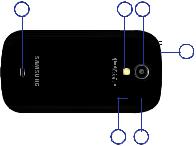
Back View
The following illustration shows the external elements of your device:
1. Camera lens is used to take photos.
2. Flash is used to take photos in low-light conditions.
3. External speaker allows you to hear ringers, music, and other sounds offered by your phone.
4. micro SIM Card Slot (internal) Installation location for SIM card.
5. microSD Card Slot (internal) allows you use a microSD
card to expand the memory of your device.
6. Headset jack allows you to connect a hands-free headset so you can listen to music.
24
